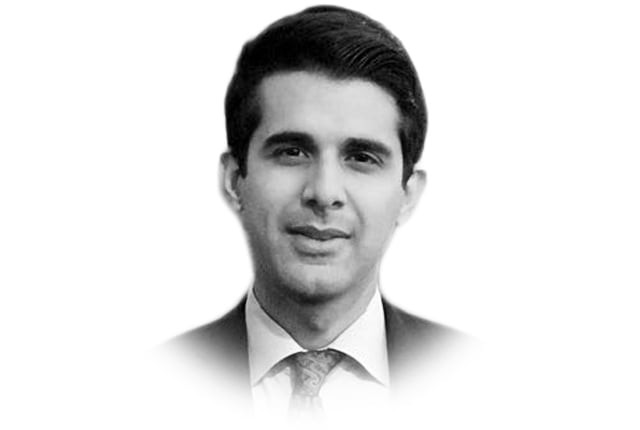Remembering and forgetting Syria
The 2010 self-immolation of a street vendor started a series of revolutions across the Middle East

The writer is a lawyer and can be reached on Twitter @shahzaibkhan901
Since the revolutions were mostly against despotic Arab regimes that had ruled their respective subjective for decades, the revolutionary movement came to be known as the Arab Spring, Arab for the fact that the revolution came to Arab countries and Spring for the hope that the revolution brought with it. While transforming, amongst others, Egypt and Tunisia, the Arab Spring had also come to Syria. But as the revolution came the spring didn’t, and Syrians found themselves in the grip of an eternal, cold autumn. The spring, forever on the horizon, never came.
After years of war and successive tragedies that scarred the collective psyche of the world enough for it to paradoxically render the same numb, as Erdogan, Putin and Rowhani met in Tehran, the Russian president and his Iranian counterpart rejected Erdogan’s proposal for a ceasefire in Idlib.
Syria’s northwestern province is being relentlessly bombarded right now. As Syrian President Bashar al Assad’s forces prepare for a final onslaught on the last rebel held enclave of Idlib, the battle is most likely to produce the worst humanitarian disaster of the 21st century.
Then again Syria is all too familiar with humanitarian disasters. From internal disturbance to civil war to proxy war, Syria’s path in recent memory is paved with violence. A lot of this violence has to do less with the Syrian struggle for democracy, a struggle against the despotic regime of Syrian President Bashar al Assad, or an indigenous Syrian struggle riding the wave of hope that came with the Arab spring. Instead, a lot of this violence has to do with the remnants of the Cold War that in its wake destroyed nations for much of the latter half of the 20th Century. The pattern is all too familiar. Two global superpowers taking on each other while quite inexplicably forcing a third unsuspecting people to play host to their “war games.” The results quite expectedly were disastrous for the host nations of, inter alia, Korea in the 1950s, Vietnam in the 60s and Afghanistan in the 80s and 90s.
Now, however, it is not just the two global superpowers of yore that play proxy war in Syria while holding talks in comfortable rooms in Geneva, but regional superpowers too. The Syrian conflict is not about the resistance to Assad anymore, or about revolution, or even democracy, and it hasn’t been about these things for most of its years now, instead it is about global and regional power. Had it actually been about revolutionary democracy, Syrian peace would not have been decided or undecided by the US, Iran, Russia, Saudi Arabia and Turkey in Geneva, Tehran, or Moscow, but in the streets of Damascus by Assad and his subjects.
With Syria a battlefield for the settlement of regional and global power-betting, one side seems to be taking the cake, or whatever’s left of it. Assad, backed by Tehran and Moscow, has largely prevailed in perhaps the most convoluted conflict in recent history. Having battled
US-backed Syrian rebels, Turkish-backed Syrian forces, independent Kurdish forces and separately ISIS, with the support of Iranians on the ground and Russians in the air and sea, Assad’s government now controls most of Syria with the last remaining rebel stronghold being Idlib. And so, the assault on Idlib.
As if years of destruction, death and displacement weren’t enough, the residents of Idlib now have to face the recurring threat of indiscriminate and disproportionate chemical attacks. And herein lies the greatest tragedy of the Syrian war.
Chemical attacks have taken place in Syria before, and hundreds if not thousands of innocent men, women and children have died horrible deaths, but no one seems to know for sure where the attacks are coming from. Every time there is a chemical attack, one side, being led by the US and rebel forces blames the Assad regime for using the chemical weapons, which they correctly cite as further undermining the legitimacy, if any, of the regime. On the other hand, the same chemical attack is attributed by the Assad Regime and its allies in Moscow to US-backed rebels who they define as fundamentalist terrorists who carry out the chemical attacks to terrorise local populations and to undermine the legitimacy of the Government by attributing the attacks to the regime. This is the greatest tragedy of the Syrian war, that most things about it are hardly Syrian, except the people dying in the war.
Now then, as Government tanks tear into Idlib, the world is quite preposterously forecasting another devastating chemical attack on civilians in Idlib, but at the same time disagreeing about the attribution of the forecasted attack. Chemical attacks are nothing short of terrorist attacks, given their indiscriminate, violent and disproportionate effect on innocent civilians. If world powers were to collectively forecast a major terrorist attack on a civilian population and do nothing about it instead of blaming each other, would that not be completely preposterous? Yet this is exactly what is happening right now.
As the US and its allies already blame the forecasted chemical attack on Assad, and as Assad and his allies blame it on terrorists backed by the US, there is absolutely and criminally no certainty for a course of action by world powers to stop this attack. The only thing that is certain and forecasted is that innocent Syrians will continue to die, and that, as articulated by Faiz, “anyone can trample them out of shape, undisturbed by a single moan of protest,” in this cold Syrian autumn.
Published in The Express Tribune, September 14th, 2018.
Like Opinion & Editorial on Facebook, follow @ETOpEd on Twitter to receive all updates on all our daily pieces.















COMMENTS
Comments are moderated and generally will be posted if they are on-topic and not abusive.
For more information, please see our Comments FAQ